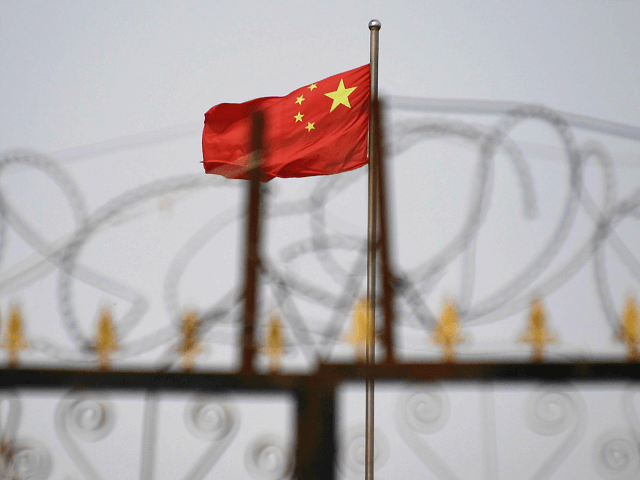Chinese Foreign Ministry spokeswoman Hua Chunying accused America on Thursday of seeking to impose “forced poverty” on the nation’s Uyghur population by opposing their enslavement.
China is believed to have built over 1,000 concentration camps for ethnic Uyghurs and other Muslim minorities in Xinjiang, its westernmost province. Survivors of the camps, the few who have escaped, have testified to being forced into slavery in addition to other human rights atrocities, such as indoctrination, torture, forced abortion, infanticide, rape, and testing for live organ harvesting.
On Wednesday, the U.S. Department of Homeland Security (DHS) announced it had identified a Chinese company, Xinjiang Production and Construction Corps (XPCC), for which it had “information that reasonably indicates the use of forced labor, including convict labor” in its cotton products. As of Wednesday, Customs and Border Protection (CBP) would follow orders to seize any imports from XPCC to conform with American laws against trafficking in products made by slaves.
Slavery is legally an umbrella term for several practices, including forced labor and human trafficking. Slaves are individuals treated as property, rather than persons, under the law. Years of investigations into China’s treatment of Uyghurs in concentration camps, and their open sale in the Chinese market, suggests the Communist Party does not allow them to exercise their rights as people.
The Chinese Communist Party maintains that the concentration camps, which at their peak imprisoned up to 3 million people, are “vocational training centers” meant to give underprivileged Uyghurs the education they need to excel in the Chinese economy. The U.S. government has since estimated that that number has fallen to about 2 million people, most of them Uyghurs, Kazakhs, or Kyrgyz people.
This year, after global outrage surrounding the camps, Chinese officials began to claim that the prisoners had “graduated” from the camps. Evidence began to surface months later that “graduation” meant that the Communist Party was shipping concentration camp slaves out of Xinjiang to factories elsewhere in the country.
The Communist Party has since rebranded the forced labor as “facilitation of employment.”
Hua argued on Thursday that any opposition to human rights abuses against Uyghurs in Xinjiang is secretly support for their poverty.
“On the one hand, these U.S. politicians claim to be concerned about the rights of ethnic minorities in Xinjiang and act as if they are their protectors,” Hua told reporters, “but on the other hand, they resort to pressure, sanctions, and other means to suppress Xinjiang’s enterprises and disturb Xinjiang’s stability, development, and prosperity.”
“How is that different from depriving people in Xinjiang of their lawful right to pursue a better life though labor?” She asked. “Don’t they intend to incite ‘forced unemployment’ and ‘forced poverty’ in Xinjiang?”
Hua called any allegations of forced labor in Xinjiang “disinformation” meant to “contain China’s development.”
“The U.S. practice violates the international trade rules and market economy principles, destroys the global industrial chains and supply chains, and damages the interests of enterprises and consumers in various countries, including the United States,” she said. “This is a typical act of hurting others’ interests while diminishing one’s own interests.”
Hua also referred to slavery in Xinjiang as “stable employment.”
Cotton is one of Xinjiang’s most profitable industries. Experts estimate that 84 percent of cotton produced in China comes from Xinjiang, representing as much as a fifth of the world’s cotton.
“Almost every major apparel brand and retailer selling cotton products is potentially implicated,” the Coalition to End Forced Labour in the Uyghur Region, a group of hundreds of labor and human rights group, revealed in a letter in July. “Right now, there is near certainty that any brand sourcing apparel, textiles, yarn or cotton from the Uyghur Region is profiting from human rights violations, including forced labor, both in the Uyghur Region and more broadly throughout China.”
Some companies have attempted to distance themselves from the slavery scandal by moving operations out of Xinjiang; Adidas has notably pushed an effort to distance itself from the practice. Others, however, have openly embraced it. The Japanese companies Muji and Uniqlo advertise their products as made from “Xinjiang cotton,” asserting its allegedly superior quality.
A study published this year by the Australian Strategic Policy Institute (ASPI) identified 83 international companies benefitting from Uyghur slave labor taking place outside of Xinjiang. The study also revealed the Chinese communist regime using monetary incentives to sell the slaves to companies outside of the province. Among the big-name brands identified were Nike, Apple, BMW, Nintendo, Adidas, and Gap.
Congress introduced legislation to combat the importing of slave products, the Uyghur Forced Labor Prevention Act, in March. the New York Times identified Apple and Nike, as well as other companies like Coca-Cola, as sending lobbyists to weaken the provisions in the bill, which would currently require companies to proactively prove that any imports from Xinjiang were not made by slaves.

COMMENTS
Please let us know if you're having issues with commenting.